Acceptance Of Resignation Letter Of Director
[Your Name]
[Your Title/Position]
[Company Name]
[Company Address]
[City, State, ZIP Code]
[Date]
[Director's Name]
[Director's Title]
[Director's Address]
[City, State, ZIP Code]
Dear [Director's Name],
Subject: Acceptance of Resignation
I am writing to formally acknowledge receipt of your resignation letter dated [Date of Resignation]. It is with mixed emotions that I accept your decision to step down from your position as a Director at [Company Name].
We would like to express our sincerest appreciation for your valuable contributions, dedication, and hard work during your tenure with us. Your leadership and guidance have been instrumental in the growth and success of our organization.
We understand that personal and professional circumstances may necessitate such decisions, and while we are sad to see you go, we respect your choice. Please know that you will be missed, and your impact on our team will be remembered for a long time.
To ensure a smooth transition, we kindly request your assistance in handing over your responsibilities and any ongoing projects to [Name of Successor or Relevant Team Member]. Your experience and knowledge will be immensely helpful during this process.
As per company policy, your last working day will be on [Last Working Day], which allows us ample time to finalize all formalities related to your departure. We will ensure that all dues, benefits, and outstanding payments are settled accordingly.
We also request you to return any company property, documents, or confidential information in your possession before your last working day.
On behalf of the entire [Company Name] team, I extend our best wishes for your future endeavors. If you ever wish to return or need any support from us in the future, please do not hesitate to reach out.
Once again, thank you for your significant contributions to [Company Name], and we wish you every success in your future endeavors.
Yours sincerely,
[Your Name]
[Your Title/Position]
[Company Name]
Formal Acceptance of Director Resignation Letter
Subject: Acceptance of Your Resignation from Board of Directors
Dear [Director's Name],
This letter serves to formally acknowledge receipt of your resignation letter dated [Date], wherein you tendered your resignation from your position as Director of [Company Name], effective [Date].
After careful consideration by the Board of Directors during our meeting on [Date], we hereby accept your resignation with sincere regret. Your contributions to our organization over the past [Duration] have been invaluable, and your strategic insights have significantly contributed to our growth and success.
We understand your decision is based on [Reason if appropriate], and we respect your choice to pursue new opportunities. Your professionalism and dedication have set a commendable standard for future board members.
Please be advised that your resignation will be recorded in the corporate minutes, and all necessary documentation will be updated accordingly. We will arrange for the return of any company property and the completion of your final administrative requirements.
We wish you continued success in your future endeavors and hope our paths may cross again professionally.
Sincerely,
[Chairman's Name]
Chairman of the Board
[Company Name]
Heartfelt Acceptance of Retiring Director Letter
Subject: Accepting Your Well-Deserved Retirement
Dear [Director's Name],
It is with mixed emotions that we accept your resignation from the Board of Directors, effective [Date]. While we celebrate your well-earned retirement, we cannot help but feel a profound sense of loss at your departure.
Your [Number] years of unwavering service have been nothing short of extraordinary. You have witnessed and guided our company through numerous transformations, economic challenges, and triumphant moments. Your wisdom, experience, and steady hand have been our anchor through both calm and stormy seas.
The legacy you leave behind is immeasurable. From mentoring junior executives to making tough decisions that shaped our company's future, your impact will be felt for generations to come. The principles you've instilled and the culture you've helped build will continue to guide us forward.
As you embark on this new chapter of your life, please know that you will always be part of our corporate family. We hope you'll consider joining our Advisory Council, where your counsel would continue to be treasured.
Enjoy your retirement, and thank you for everything.
With deepest gratitude and warm regards,
[Name]
Chief Executive Officer
Quick Acceptance of Immediate Resignation Email
Subject: Immediate Acceptance of Resignation - [Director's Name]
Dear [Director's Name],
This email confirms our acceptance of your immediate resignation from the Board of Directors, as submitted today.
Given the urgency of your departure, we are implementing the following immediate actions:
- Your access to company systems will be deactivated by end of business today
- Please return all company property to [Contact Person] by [Date]
- Your final documentation will be processed within 48 hours
- Board responsibilities will be redistributed among remaining members
We understand the circumstances necessitating your immediate departure and respect your decision. Your transition duties will be handled internally to ensure continuity.
Please contact [HR Contact] at [Email/Phone] for any final administrative matters.
Best regards,
[Name]
Board Secretary
Acceptance of Resignation Due to Conflict of Interest Letter
Subject: Acceptance of Resignation - Conflict of Interest Matter
Dear [Director's Name],
We acknowledge receipt of your resignation letter dated [Date], citing potential conflict of interest arising from [Brief Description of Situation].
Your proactive approach in identifying and addressing this potential conflict demonstrates the highest level of professional integrity and commitment to corporate governance principles. The Board commends your ethical stance and transparency in this matter.
We hereby accept your resignation, effective [Date], and want to express our appreciation for your service during your tenure. Your contributions to [Specific Projects/Achievements] have been significant and will have lasting positive impact on our organization.
The Board will ensure that all matters related to your departure are handled with complete confidentiality and professionalism. We understand this decision was not made lightly and respect your commitment to maintaining the highest ethical standards.
Should circumstances change in the future, we would welcome the opportunity to consider your return to the Board when appropriate.
Respectfully,
[Name]
Chairman of the Board
Casual Acceptance of Resignation Email
Subject: Got it - Thanks for Everything!
Hi [Director's Name],
Thanks for your message about stepping down from the board. While I hate to see you go, I completely understand your reasons.
You've been amazing to work with over the past [Time Period]. From our late-night strategy sessions to your brilliant insights during our pivot last year, you've been instrumental in getting us where we are today.
We'll definitely miss your expertise and that unique perspective you always brought to our discussions. I know the timing works better for you now, and we want to make this transition as smooth as possible.
Let's set up a quick call this week to chat about the handover and make sure we've got everything covered. And hey, this better not mean we won't see you at our company events anymore!
Thanks again for everything, and let's definitely stay in touch.
Cheers,
[Name]
CEO
Acceptance of Health-Related Resignation Letter
Subject: Acceptance of Resignation - Our Thoughts Are With You
Dear [Director's Name],
We have received your resignation letter and want to first express our concern and support regarding your health situation. Your well-being is our primary concern, and we completely understand your need to focus on your recovery.
The Board unanimously accepts your resignation, effective [Date], with our full support and understanding. Please know that your health and recovery take absolute priority, and we respect your decision to step down during this challenging time.
Your contributions to our organization have been exceptional, and your absence will be deeply felt. However, we want you to concentrate fully on getting better without any concerns about board responsibilities.
We are arranging for [Specific Support Measures] to ensure a smooth transition of your duties. Please don't hesitate to reach out if you need any assistance with administrative matters or if there's anything we can do to support you during this time.
Our thoughts and best wishes are with you for a complete and speedy recovery. Take all the time you need, and remember that our door is always open.
With warmest regards and best wishes,
[Name]
Board Chairman
Formal Acceptance of Resignation Due to Relocation Letter
Subject: Acceptance of Resignation Due to Relocation
Dear [Director's Name],
This letter acknowledges your resignation from the Board of Directors due to your upcoming relocation to [Location], effective [Date].
We understand that your move to [New Location] presents logistical challenges that make continued board service impractical. While we regret losing your valuable input, we recognize that geographic distance would significantly impact your ability to fulfill your directorial responsibilities effectively.
During your tenure, you have contributed significantly to [Specific Achievements/Projects]. Your expertise in [Area of Expertise] has been particularly valuable in guiding our strategic decisions.
We are curious whether you might be interested in participating in our board meetings virtually on occasion, should your schedule and our governance requirements permit. We would value your continued input even in a limited capacity.
Please let us know your forwarding address for any future correspondence, and we wish you success in your new location.
Best of luck with your relocation and future endeavors.
Sincerely,
[Name]
Corporate Secretary
What is an Acceptance of Resignation Letter of Director and Why is it Needed
An acceptance of resignation letter of director is a formal document that acknowledges and confirms the receipt of a director's resignation from a company's board. This letter serves multiple critical purposes: it provides legal documentation of the resignation acceptance, establishes the effective date of departure, maintains corporate governance records, and ensures proper transition of responsibilities. The letter creates a paper trail that protects both the organization and the departing director from potential legal complications while demonstrating professional courtesy and maintaining positive relationships.
When Should an Acceptance of Resignation Letter Be Sent
Several scenarios trigger the need for this letter:
- Upon receiving a formal resignation from any board member
- When a director steps down due to retirement or career changes
- In cases of resignation due to health issues or personal circumstances
- When conflicts of interest arise requiring director departure
- During corporate restructuring or mergers requiring board changes
- If a director relocates and cannot fulfill duties effectively
- When resignation is submitted due to disagreement with company direction
- Following completion of predetermined term limits or rotating positions
- In emergency situations requiring immediate director departure
- After acceptance by the board of directors in formal meeting
Who Should Send the Acceptance Letter
The authority to send acceptance letters varies by organization structure:
- Board Chairman: Most common sender, representing the collective board
- Corporate Secretary: Often handles formal correspondence and documentation
- Chief Executive Officer: In smaller companies or when board chairman unavailable
- Lead Independent Director: In cases involving chairman resignation
- Remaining Board Members: Collectively signed letter in certain situations
- Company President: Alternative in companies without separate chairman role
- Legal Counsel: In complex situations requiring legal oversight
- Board Governance Committee Chair: For governance-related resignations
To Whom Should the Acceptance Letter Be Addressed
The letter should be directed to:
- Primary Recipient: The resigning director personally
- Secondary Recipients: May include family members if resignation is health-related
- Corporate Records: Filed in company's official governance documents
- Regulatory Bodies: When required by law or stock exchange rules
- Legal Counsel: For complex resignations requiring legal review
- Insurance Companies: If director liability coverage is affected
- Audit Committee: For oversight and compliance purposes
- Other Board Members: For transparency and record-keeping
Requirements and Prerequisites Before Sending
Essential preparations include:
- Board Resolution: Formal vote accepting the resignation must be recorded
- Legal Review: Ensure compliance with bylaws and governance requirements
- Documentation Check: Verify original resignation letter and effective date
- Transition Planning: Arrange coverage of departing director's responsibilities
- Administrative Tasks: Prepare for access revocation and property return
- Regulatory Compliance: Check if filing requirements exist with authorities
- Insurance Notification: Update director liability coverage as needed
- Committee Restructuring: Plan redistribution of committee assignments
- Shareholder Communication: Prepare announcements if publicly required
How to Write and Send the Acceptance Letter
The writing process involves:
- Draft Preparation: Create initial version using appropriate template
- Board Consultation: Review with other directors for accuracy and tone
- Legal Verification: Ensure compliance with corporate governance standards
- Personalization: Customize content based on resignation circumstances
- Approval Process: Obtain necessary signatures and authorizations
- Professional Formatting: Use company letterhead and formal business format
- Delivery Method: Choose appropriate sending method (certified mail, email, hand delivery)
- Timing Consideration: Send promptly after board acceptance decision
- Record Keeping: Maintain copies in corporate files and board minutes
Formatting Guidelines and Best Practices
Key formatting elements include:
- Length: Typically 1-2 pages, concise but comprehensive
- Tone: Professional yet warm, matching the resignation circumstances
- Structure: Clear opening, acknowledgment, appreciation, transition details, closing
- Letterhead: Official company branding and contact information
- Date and Reference: Include dates of resignation and board meeting
- Signatures: Appropriate authority figures with titles
- Delivery Method: Formal letter for serious matters, email for routine resignations
- Language: Clear, respectful, avoiding legal jargon when possible
- Confidentiality: Appropriate level based on resignation reasons
Follow-up Actions After Sending
Post-sending responsibilities include:
- Confirmation of Receipt: Verify the departing director received the letter
- Administrative Updates: Update all corporate records and directories
- Access Management: Ensure timely revocation of systems and facilities access
- Property Recovery: Arrange return of company materials and equipment
- Transition Coordination: Complete handover of specific responsibilities
- Regulatory Filings: Submit required notifications to relevant authorities
- Insurance Updates: Modify director liability coverage as appropriate
- Board Restructuring: Implement committee changes and new assignments
- Stakeholder Communication: Inform relevant parties about the change
- Documentation Filing: Store all related documents in corporate records
Common Mistakes to Avoid
Frequent pitfalls include:
- Delayed Response: Waiting too long to acknowledge resignation creates uncertainty
- Incomplete Documentation: Missing key details about effective dates or terms
- Inappropriate Tone: Using wrong level of formality for the situation
- Legal Oversights: Failing to comply with corporate governance requirements
- Poor Timing: Sending before proper board approval or discussion
- Inadequate Appreciation: Not acknowledging contributions appropriately
- Transition Gaps: Failing to address continuity of director's responsibilities
- Confidentiality Breaches: Sharing inappropriate details about resignation reasons
- Administrative Errors: Incorrect dates, names, or procedural references
- Follow-up Failures: Not completing necessary post-resignation tasks
Pros and Cons of Formal Acceptance Letters
Advantages:
- Creates clear legal documentation of resignation acceptance
- Demonstrates professional respect and courtesy to departing director
- Establishes definitive timeline for transition and responsibilities
- Protects organization from potential legal disputes
- Maintains positive relationships for future collaboration
- Provides closure and clarity for all parties involved
Disadvantages:
- Time-consuming process requiring multiple approvals
- Potential for creating awkward situations if resignation is contentious
- May establish precedent for elaborate departure procedures
- Could complicate matters if resignation terms need modification
- Administrative burden of proper documentation and filing
- Risk of inappropriate tone or content causing offense
Elements and Structure of the Acceptance Letter
Essential components include:
- Header: Company letterhead with official branding and contact information
- Date and References: Clear dating and reference to original resignation
- Salutation: Appropriate greeting using proper name and title
- Acknowledgment: Formal statement accepting the resignation
- Appreciation: Recognition of contributions and achievements
- Transition Details: Information about handover and final responsibilities
- Administrative Notes: Instructions for property return and access
- Future Relationship: Statements about ongoing connection if appropriate
- Closing: Professional sign-off with signature and title
- Distribution: Indication of who receives copies for record-keeping
Frequently Asked Questions About Acceptance Letters
Q: Is an acceptance letter legally required? A: While not always legally mandated, it's strongly recommended for documentation and governance purposes.
Q: Can resignation acceptance be conditional? A: Generally no, though transition timing may sometimes be negotiated.
Q: What if the board doesn't want to accept the resignation? A: Directors typically cannot be forced to continue serving against their will.
Q: Should the letter mention resignation reasons? A: Only if appropriate and with the departing director's consent.
Q: How quickly should acceptance be communicated? A: Ideally within one week of receiving resignation, after proper board consideration.
Q: Can acceptance letters be sent electronically? A: Yes, though important resignations often warrant formal printed letters.

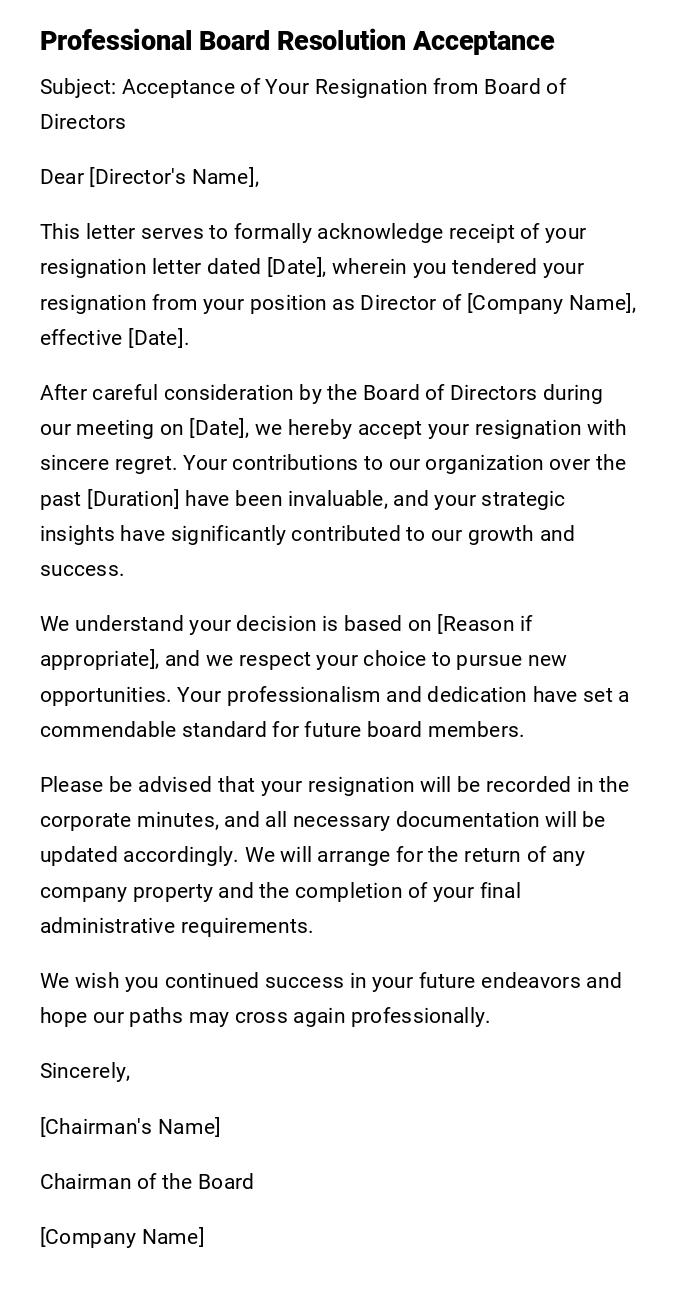
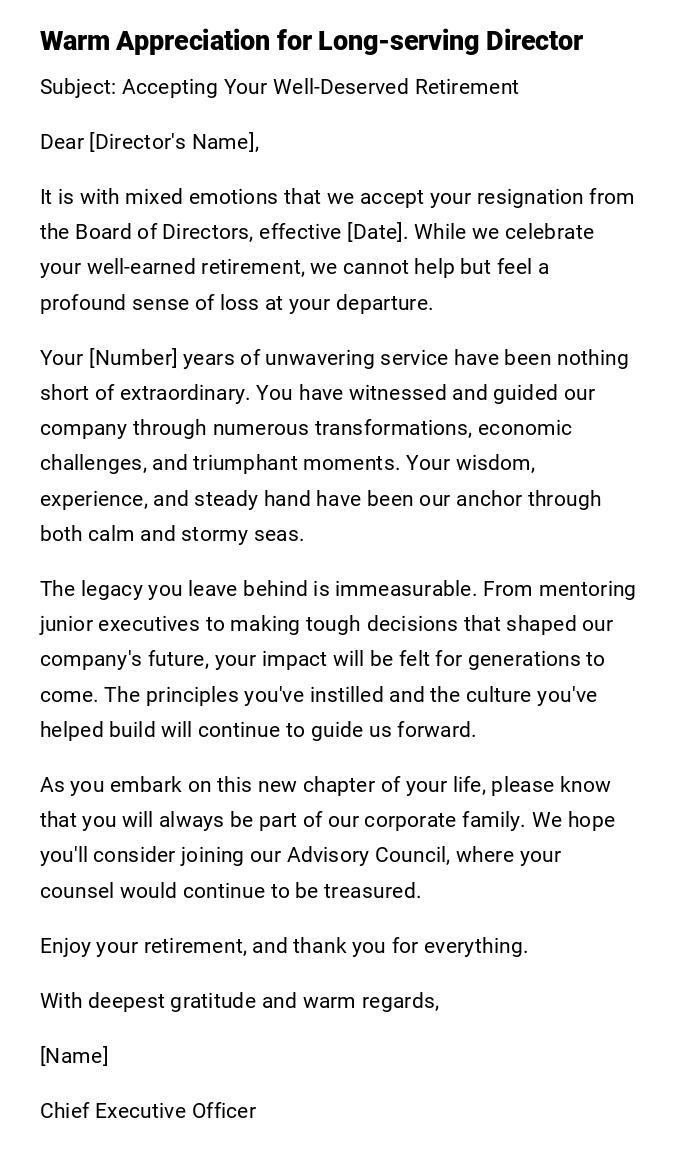
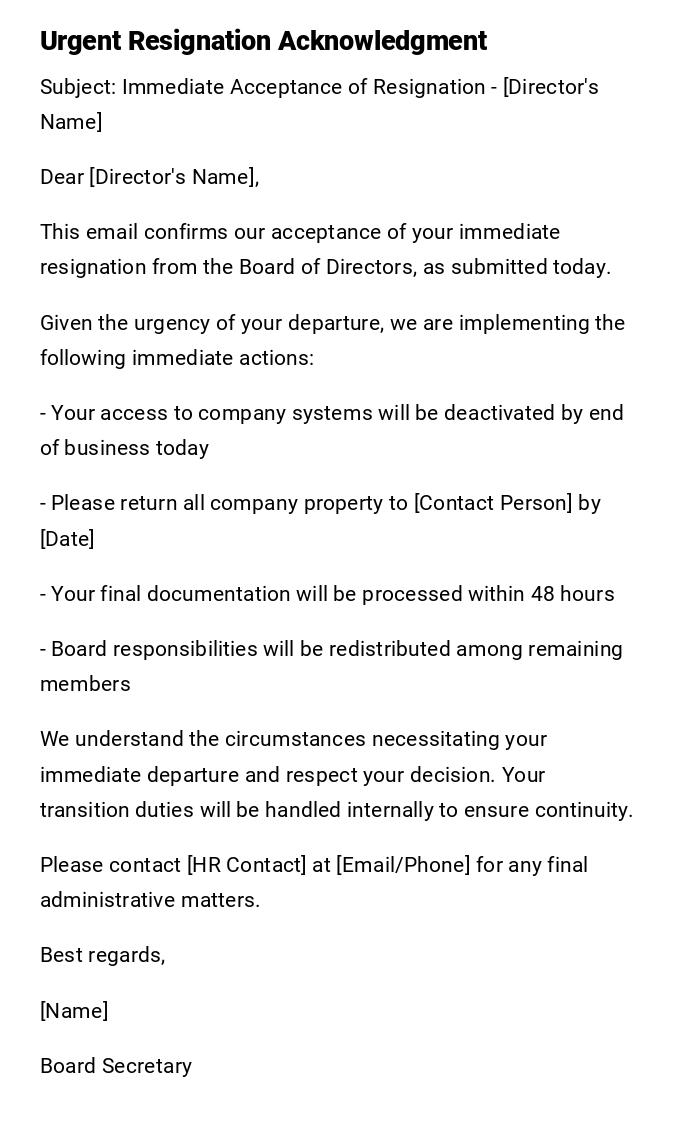
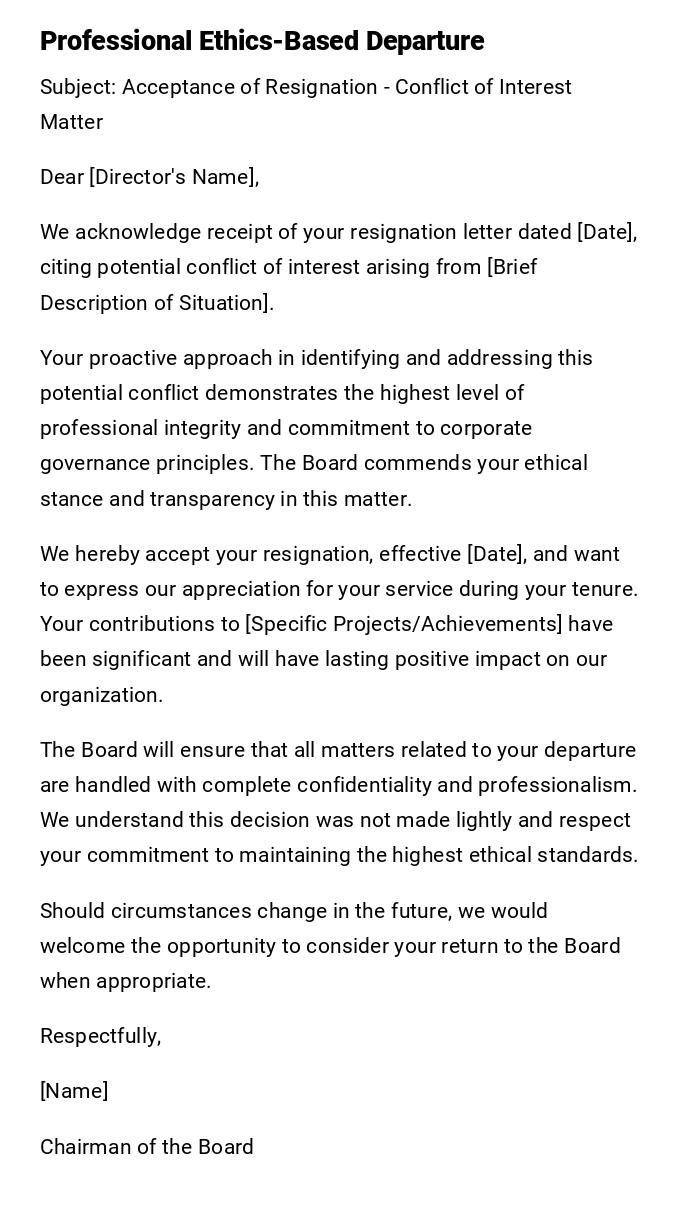

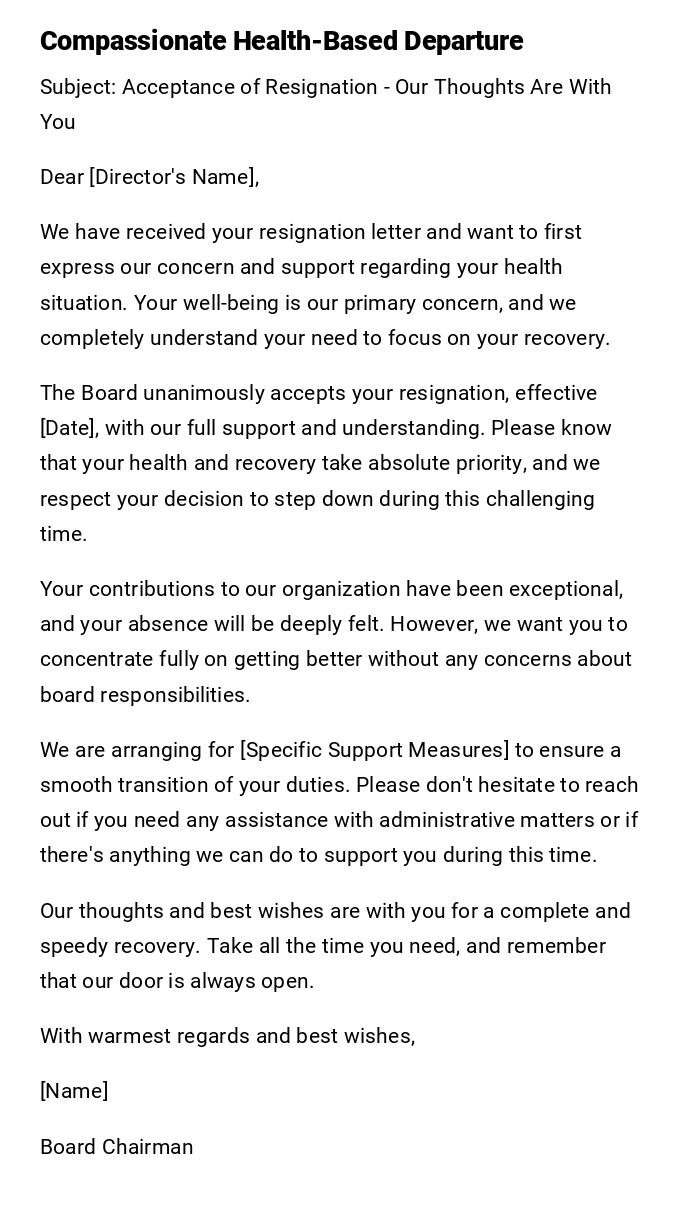
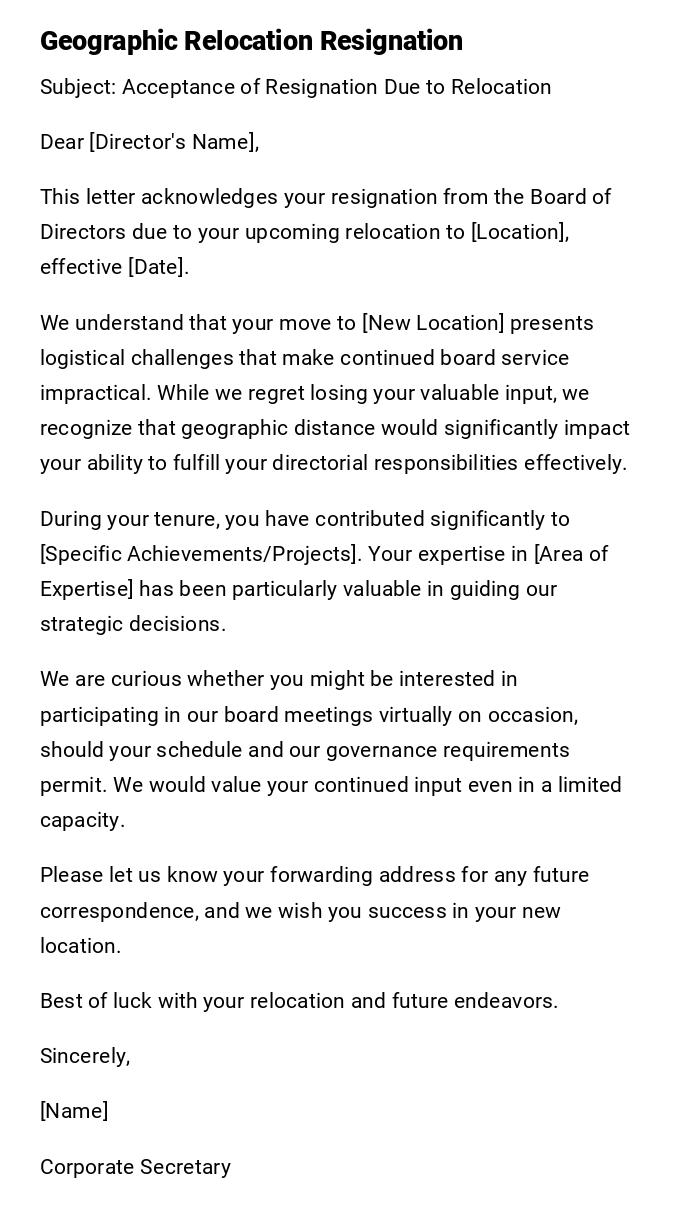

 Download Word Doc
Download Word Doc
 Download PDF
Download PDF